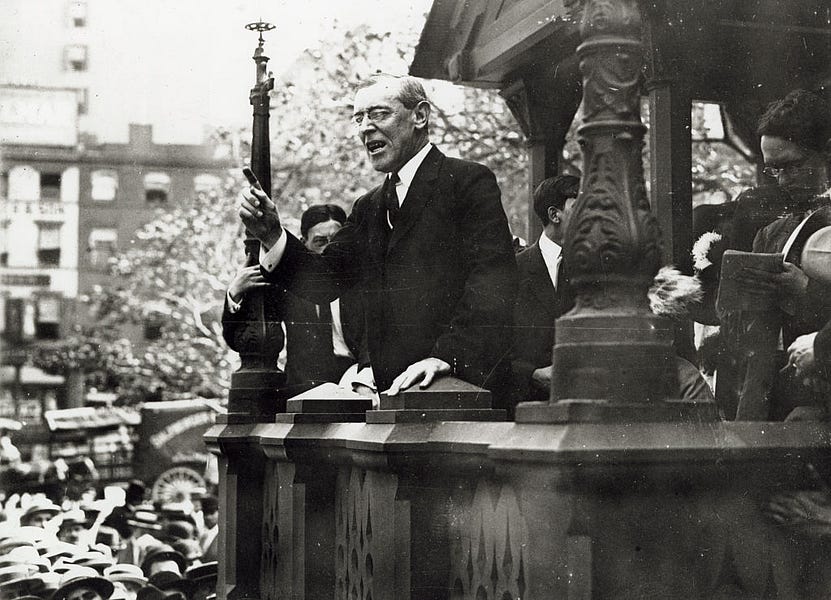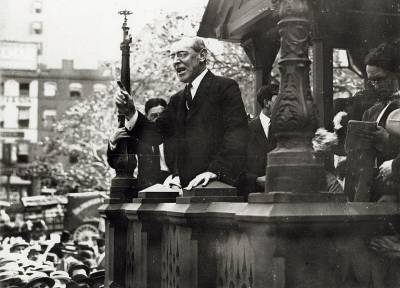Hey,
I should be enjoying this more.
Longtime readers (and listeners) are probably aware that I’ve been beating up on Woodrow Wilson for about 15 years now.
When I was working on Liberal Fascism, among the most surprising things I learned was how terrible Woodrow Wilson was, and I’ve been something of a proselytizer of anti-Wilsonism. (I prefer not to use “Wilsonianism” or “Wilsonian” because I think that’s a school of foreign policy thought, whatever its flaws, that can be disconnected from the president who gave it its name.)
Now, I’ve been saying for a while that if I had to do it over, I’d write Liberal Fascism differently. But what I would probably leave largely untouched is the chapter on Wilson. In fact, if anything I’d probably be harder on him. Regardless, I think if an honest history of how attitudes have changed on Wilson in recent years were written, I would get a nice chunk of credit. Certainly not the lion’s share or anything close. But, I’m hard-pressed to think of anyone other than Damon Root, who did more to get the argument out there in wide circulation on the right. (You might say Glenn Beck, who used to do road shows on the topic, but I think he would freely admit he got turned on to the topic by me.)
When I started out on this project of righteous vilification, most eggheads—outside the orbit of the Claremont Institute—thought I was a nut and a crank. Many still think that, I am sure, but they are delightfully silent on the issue of Wilson these days. The New York Times review of my book—which, I might note, voiced no objections with my thesis until I got to FDR—was titled, mockingly “Heil Woodrow!”
Why hate Wilson?
Before I continue, I think it might be of service to The Dispatch readers to offer an all-too brief explainer of why I think Woodrow Wilson was so terrible. He was a detestable president for reasons beyond his racism, but since that is the issue that is driving his erasure from institutions, bridges, and buildings, I see no reason not to start there.
During the current riot of iconoclasm, important distinctions are being lost. One distinction in particular is very important: What did the person stand for when he or she was alive? Tearing down the statue of Hans Christian Heg—an abolitionist immigrant and Union officer who gave his life to end slavery—is an act of barbaric asininity. But even in the more complicated cases of some of the Founders or even Abraham Lincoln (which I don’t think is a complicated case: He was a hero), the condemnations don’t take into account what these figures were fighting for. Say what you will about Lincoln’s racial views (when he was younger), there’s no disputing that he was at the bloody tip of the spear of social progress. Put more plainly, there’s a difference between a flawed agent of positive change and an unalloyed champion of turning back the clock.
I don’t want to go down that rabbit hole, save to make this point: Wilson was a reactionary on race and the Confederate cause in his own time. The first Southerner to take the White House since before the Civil War—a war in which he thought the good guys lost. When he came to Washington, one of his first priorities was to undo the racial progress made by the Republicans: He restored segregation in the federal government. Blacks were sent to different bathrooms, cafeterias, etc. in the name of racial hygiene. When a delegation of black leaders visited the White House, he told them, “segregation is not a humiliation but a benefit, and ought to be so regarded by you gentlemen.” When one journalist objected, Wilson snapped, “Your manner offends me,” and he was sent packing.
“I have recently spent several days in Washington,” Booker T. Washington wrote after visiting D.C. during Wilson’s first term, “and I have never seen the colored people so discouraged and bitter as they are at the present time.”
It’s important to note that Wilson’s racism was only partly a function of his Southern heritage. He was a thoroughly modern progressive (as were many Southern politicians). Consider his view of Lincoln. Wilson admired Lincoln for his dictatorial and centralizing use of state power—he just lamented that Lincoln’s means were used for the wrong ends. More often than not, Wilson justified his racism not in the language of Southern heritage but in the “scientific” language of eugenics. His academic writing is saturated with talk of “inferior races,” “stagnant nationalities” and “Aryan” superiority. Wilson was an unapologetic subscriber to various notions of eugenics (and as governor of New Jersey, he created the Board of Examiners of Feebleminded, Epileptics, and Other Defectives).
This is an important point because many apologists for Wilson—or progressivism—like to pretend that the original Progressivism and racism were at some fundamental level in conflict. They weren’t. Not all progressives were racists, but a great many racists were progressives, and a great many racist doctrines were central to progressivism.
The rest of the story.
But it would be a shame to let this crisis for Wilson-lovers go by without seizing the opportunity to point out why he was horrible for reasons beyond his racism.
First of all, he was astoundingly petty. When a British friend asked Col. Edward House—Wilson’s top adviser—asked for advice on how best to approach Wilson, House told him “Never begin by arguing. Discover a common hate, exploit it, get the President warmed up and then start on your business.” White House physician Dr. Cary T. Grayson said that Wilson was a “man of unusually narrow prejudices,” “intolerant of advice.” “If one urges Wilson to do something contrary to his own conviction, he ceases to have any liking for that person.” Sound familiar?
This pettiness probably has more to do with his failure to get the Senate to ratify the Treaty of Versailles than all the high-falutin reasons usually cited.
He was the first president to openly disparage the Bill of Rights and the Constitution, because they constrained the power he craved and worshipped. “If any trait bubbles up in all one reads about Wilson,” historian Walter McDougall writes, “it is this: he loved, craved, and in a sense glorified power.” Wilson himself said, “I cannot imagine power as a thing negative and not positive.”
No wonder he disliked the Constitution, a document designed first and foremost of a healthy fear of unchecked state power.
As president, Wilson used the First World War as an excuse to exercise unbridled power. He created the first modern propaganda ministry in Western civilization, the Committee On Public Information, which deployed plain-clothed agents of the state—the Four Minute Men—to foment war fever and blind support for the president. Its head, George Creel, was determined to create a “white hot mass” out of the American people under the banner of “100 percent Americanism.” The Four Minute Men would infiltrate wherever Americans gathered and give demagogic speeches to whip up the crowds.
Creel believed that fear was essential to bending the public to the needs of the president. Fear was “an important element to be bred into the civilian population. It is difficult to unite a people by talking only on the highest ethical plane. To fight for an ideal, perhaps, must be coupled with thoughts of self-preservation.”
One of the consequences of this campaign was the outrageous persecution of German-Americans and other “hyphenated Americans.” “Any man who carries a hyphen about with him carries a dagger that he is ready to plunge into the vitals of this Republic whenever he gets ready,” Wilson declared. German language and culture was subjected to a campaign of vilification that makes even today’s “cancel culture” seem tame by comparison.
Wilson used the Sedition Act to persecute non-Germans, too. He closed newspapers and magazines for the crime of disloyalty. He put thousands in jail for thought crimes, peaceful political dissent or airing “subversive” views. A Hollywood producer received a 10-year stint in jail for making a film that depicted British troops committing atrocities during the American Revolution. A clothing store salesman in Connecticut got six months in jail for offering the opinion that Lenin was one of the “brainiest” people in the world.
Again, I could go on and on.
For years, Wilson’s defenders ignored Wilson’s own role in these and countless other crimes, placing the blame not on Wilson or progressives, but on America. When conservatives sin, the blame is reserved for conservatives. When progressives sin, the fault lies with America itself. Progressivism is never in the dock.
Wilson’s supporters point to his support for “self-determination” and a new “liberal international order” as proof of his greatness. Even here they give him too much credit. Yes, he can be called an “anti-colonialist” in that he sought the dismantling of empires. But it’s never been very clear to me why this made him a small-d democrat. He loved Otto von Bismarck—hardly a democrat—as the model of statesmanship. His views on self-determination were not synonymous with democracy. Backward nationalities and races weren’t capable of democracy in his eyes. He just had a potted Darwinian-Hegelian view of social evolution—swallowed whole from German intellectuals—that held that it would be better for some races or nationalities to be governed by members of their own tribe. A nation freed from the yoke of some far-off empire was “free” to subjugate its own people in accordance with its “backward” nature. I am open to the idea of this being a little unfair to Wilson, since so many smart and informed experts insist that the Fourteen Points were an effort to spread democracy. But I am curious why the word “democracy” never appears in the Fourteen Points.
Anyway, I began by saying that I should be enjoying this more—which is not to say I’m not enjoying seeing Wilson’s reputation get a long deserved recalibration.
What bothers me about all of this is that we are in a moral panic that revolves around a very narrow band of outrage: racism! I am not saying that racism is undeserving of outrage. But I am reflexively uncomfortable with the spirit of mob action and moral panic. Wilson’s pernicious role in American history is deserving of a more thoughtful and thought-through accounting.
But I guess I’ll take what I can get.
Photograph from Library of Congress/Corbis/VCG/Getty Images.







Please note that we at The Dispatch hold ourselves, our work, and our commenters to a higher standard than other places on the internet. We welcome comments that foster genuine debate or discussion—including comments critical of us or our work—but responses that include ad hominem attacks on fellow Dispatch members or are intended to stoke fear and anger may be moderated.
With your membership, you only have the ability to comment on The Morning Dispatch articles. Consider upgrading to join the conversation everywhere.